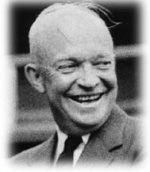 | THE GOLF SWING OF PRESIDENT DWIGHT D. EISENHOWERGolf Swing Video below |
Ike's Golf Swing Highlights What kind of golfer was President Eisenhower? 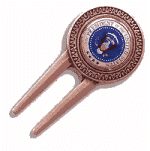 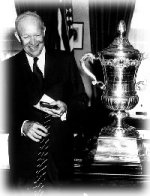
|
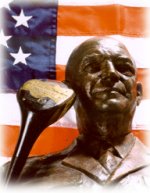 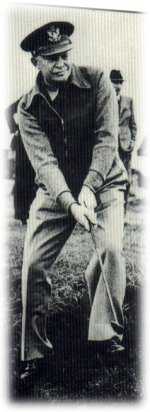 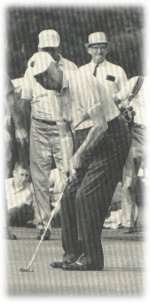 |
Dwight D. EisenhowerDwight David Eisenhower was elected the 34th President* of the United States on November 4, 1952. Four years later, he was reelected to a second term by an even wider margin. "Peace and Prosperity" became the watchwords of the Eisenhower years. Ending the war in Korea was only the first of many foreign policy challenges Eisenhower faced throughout his presidency. Other Cold War crisis erupted in Lebanon, Suez, Berlin, Hungary, the Taiwan Straits, and Cuba. When confronted with possible US military intervention in Vietnam after the defeat of the French colonials, Eisenhower declined to involve the United States. Throughout his presidency, he worked hard to contain communism and, at the same time, was vigorous in his efforts to forge improved relations with the Soviet Union. When an American U-2 reconnaissance plane was shot down over Soviet territory, his hopes for détente, during his watch, were dashed. 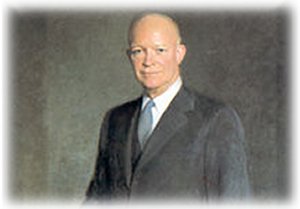 Although criticized by some historians for a lack of leadership on racial issues, President Eisenhower supported and signed the 1957 and 1960 Civil Rights Acts, and ordered federal troops to Little Rock to enforce the desegregation of Central High School. Likewise, his decision to work behind the scenes to defeat Senator Joseph McCarthy, rather than confront his excesses directly, engendered the criticism of many. Eisenhower argued that to lower himself to the same level as McCarthy might confer upon the Senator a significance that would only enhance McCarthy's credibility. Americans enjoyed a strong, expanding economy under Eisenhower, demonstrated by solid economic growth, little inflation, and low unemployment. Balancing the budget was an Eisenhower priority tempered with a sincere concern for the common good. Eisenhower expanded social security, increased the minimum wage, and established the Department of Health, Education, and Welfare (HEW). During the Eisenhower years, the Interstate Highway System and the National Aeronautics and Space Administration (NASA) were created, and space exploration began. Near the end of his presidency, in 1959, Alaska and Hawaii became the 49th and 50th states of the Union.
|
© Copyright All Rights Reserved Beau Productions - Golf Swings 2000
Golf Swings Main Site
- Top -
